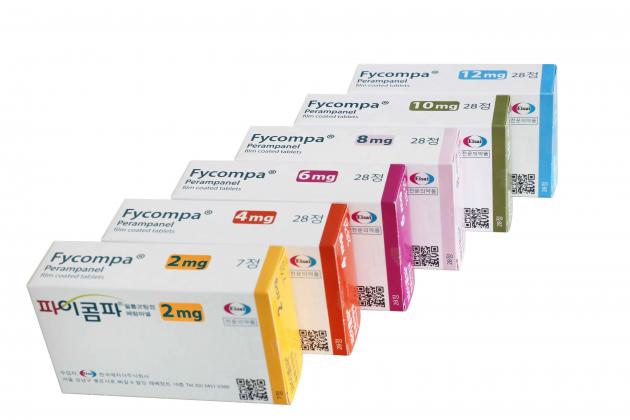Eisai Korea said that it has received an expanded indication for Fycompa, a treatment for epilepsy, from the Ministry of Food and Drug Safety on Tuesday.

Epilepsy is a chronic neurological disease in which seizures repeatedly occur due to abnormal over-excitation or over-synchronization of the brain. It is a heterogeneous group of disorders with different clinical characteristics, developmental mechanisms, and prognosis due to various causes, and exhibits a common feature of sudden and disordered brain cell excitability.
In Korea, epilepsy is a relatively common disease, with more than 190,000 patients suffering from it.
The company received approval in 2015 for the treatment as an adjunctive therapy to treat patients with partial-onset seizures (POS) with or without secondary systemic seizures and as a primary generalized tonic-clonic (PGTC) treatment for patients over 12 with idiopathic systemic epilepsy.
With the latest, doctors will be able to use the treatment as mono or adjunctive therapy for POS patients over the age of four and as adjunctive therapy for patients aged seven years and older with primary generalized tonic-clonic (PGTC) seizures.
The ministry approved the expanded indication after Eisai confirmed the treatment's efficacy through a phase 3 FREEDOM study. The study included 89 patients aged 12 to 74 years with newly diagnosed or untreated epilepsy.
As a result of administering Fycompa's maintenance dose of 4 mg per day to the patient group that satisfied modified intention-to-treat, the company confirmed that 63 percent of patients had no seizures during the 26-week maintenance period. Of those patients who had secondarily generalized seizures, 65 percent were convulsive seizure-free.
Even as a monotherapy, the treatment showed a similar safety profile to that of conventional adjunct therapy, it added.
"As patients with epilepsy take 3.2 antiepileptic drugs on average, the expanded indication of using Fycompa as a monotherapy makes it possible for patients to manage epilepsy more effectively by taking one tablet once a day," said Professor Shin Dong-wook of the Department of Neurology at Konkuk University Medical Center.
Reducing the number of medications will increase compliance for the patients, helping them to manage long-term illness, Shin added.

